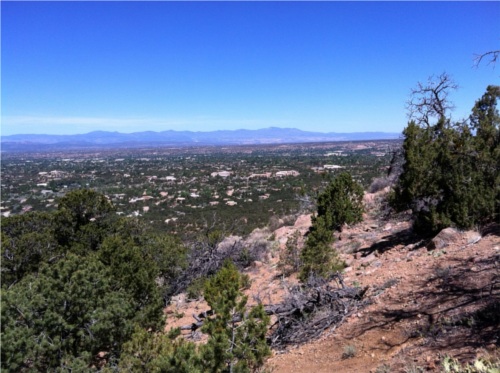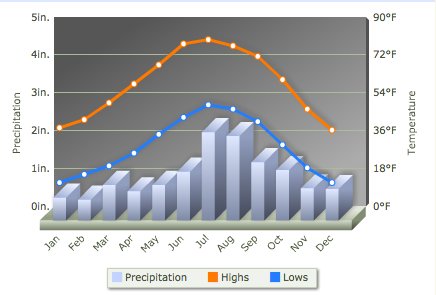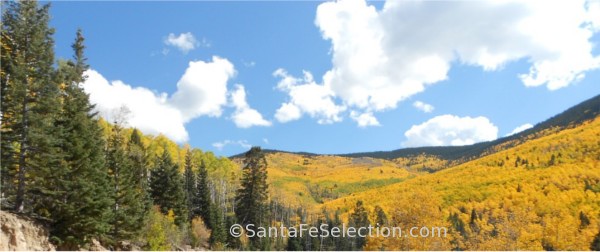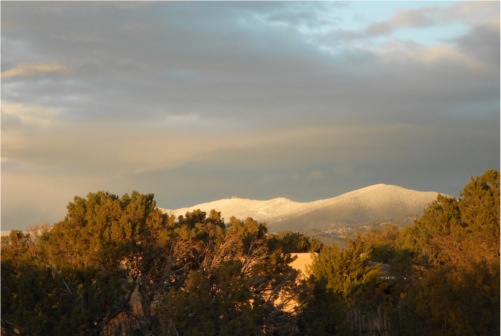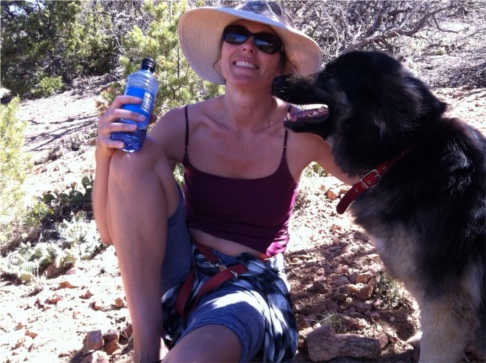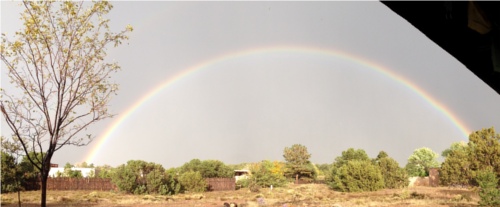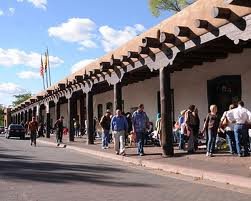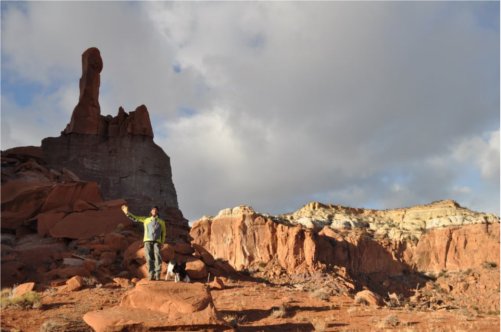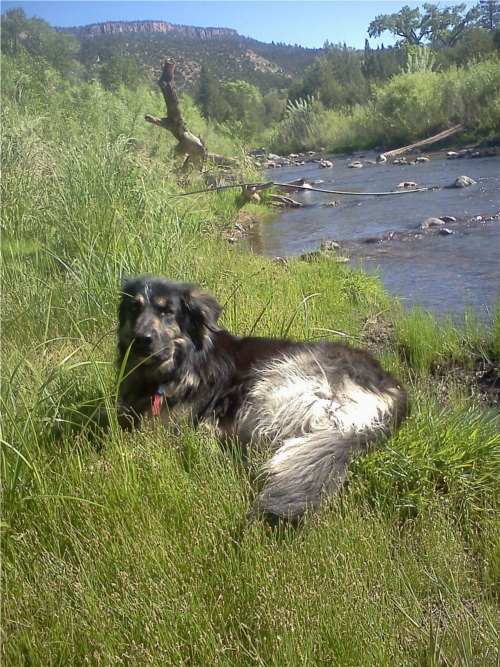When I first arrived in Santa Fe back in 1984, I was fascinated by the quality of light, and changes in weather that occurred throughout the day. And almost thirty years later, I’m still fascinated. The elevation of 7000+ feet, clean air (rated best in U.S by American Lung Assoc.) and varied terrain all play a dramatic role in the weather, lifestyle and beauty of New Mexico. The locals say, “If you don’t like the weather in Santa Fe, wait a minute.”
Along with an amazing diversity of terrain, culture, art, history, and culinary adventures, we have excellent year-round outdoor activities; terrific skiing, river rafting, kayaking, fly fishing, hiking, biking and more.
Seasons
We are blessed with an average of over 300 days of sunshine a year, and although many people mistakenly believe we are a sand-filled desert, our Sangre de Cristos mountain range is the southernmost point of the Rocky Mountains… and they are green, with rivers, lakes and streams. We have 4 distinct seasons – sometimes in as little as one day or even an hour, during certain times of year. You can keep up with our weather trends through the live weather link in our Visitor Info category on SantaFeSelection.com
Here’s a guideline chart of annual temperature and precipitation averages.
A Few Packing Tips For Your Trip
As temperatures may vary broadly during any season, the main thing to remember is that layering is the best way to be prepared for whatever the day’s weather in whatever season in Northern New Mexico.
The fall brings cool nights and mornings beginning in late August – early September. The days can warm up considerably into the mid to high 70s, and even low 80s. You’ll want to bring a warm jacket for evenings and mornings and have a light shirt under your layers for the high temps of the day. In late September through mid-October the lows are colder, down to 40s, the days can warm up to low-mid 60s, and maybe low 70s if we’re having a warm streak. By early to mid October, we see the peak of beauty in the changing leaves. By the end of October, it’s touch and go, you definitely need to be prepared for anything from cold to warm, rain or an odd snow flurry at higher elevations, so packing the layers is a must.
Winters tend to rev up starting from late November and can last toward the end of March, but there’ll be warm days interspersed through January and February just to remind us that spring is on its way. Winter snow brings great skiing and winter sports activities. Daily temperatures can vary radically from high 50s to low 30s. But the cold air is dry, so it doesn’t feel as cold as the damp, bone-chilling cold I experienced growing up in England. For a winter visit you’ll want that puffy coat, or something that will keep out the chill, and some nice warm boots with rugged soles that grip well (with scarf, hat, gloves close by, just in case).
Spring shows up from time to time during February and March, but the steady spring temperatures aren’t until late April. As a rule, we don’t plant anything in our gardens until after Mother’s Day to be sure they won’t be crippled by a late frost. Spring highs can range between an ideal low to mid 70s to nippy low 40s – high 30s at night. Intermittent winds are common between March and May, which, though not necessarily cold, can be strong. Late April, the trees are starting to blossom and in early May there’s usually an abundance of lilacs and wisterias coloring the town with shades of blue, purple, white and pink. You’ll need a spring jacket for the early morning and late evening chill, and a hat for shade. Be prepared to shed layers during the day.
After mid-May the spring is in full swing and the highs are getting higher, toward the low – mid 80s during the afternoons. By Memorial Day Weekend summer is on its way. And by June, the highs average between 80 – 90 degrees (sometimes a little higher for short spurts). Cool nights and early mornings may require an extra light layer. By 10 am it has warmed up considerably and the lightest shirt and shorts, with good walking sandals, hat, sunscreen, and sunglasses are ideal. An extra light layer is always a good idea if you can fit one in your bag, or tie around your waist or shoulders in the case of an occasional rain shower.
In July, the heat and mountainous terrain can stir up an afternoon thundershower, locals refer to it as the monsoon season. These welcome storms add a touch of drama to the skies and may last anywhere from 20 minutes to an hour delivering refreshing rains. I’d say bring an umbrella, but honestly, who cares if you get wet when it is so brief, and deliciously warm and fun! On occasion, there may be hail that can vary in size from styrofoam looking baubles to the less common golf ball size (I’d take cover for those episodes). The accompanying lightning displays are phenomenal! And then there are often gorgeous rainbows (some doubles) arcing after or during a storm.
And after maybe an hour of drama, you’re left with a fantastic sunset, slightly cooler temperatures and a perfect evening to take a nice peaceful stroll around the Plaza, listen to free music at the Plaza bandstand, and eat dinner at any of the favorite restaurants in the vicinity. A light extra layer, shawl, or sweater may be needed, if not for outside, then perhaps for inside where there may be air conditioning. Air conditioning is not a big necessity here as the adobe buildings are quite good at keeping us cool in summer but some restaurants, museums and theaters may have A/C.
There is little need for high fashion, or high heels here. Casual dress is accepted everywhere, unless you have a special occasion to attend that calls for gowns and tux (rare but has been known to happen). If you do dress up for a special occasion remember, some parking lots and some small streets are unpaved, uneven, or covered with loose gravel. (Those leather heeled Jimmy Choos might want to stay home.)
Comfortable walking shoes or hiking sandals are recommended for most activities, from strolling around the many museums and sites, to the beautiful long or short hikes that can vary from easy to moderate inclines, up to extremely steep terrain. I recommend Santa Fe Walkabouts for a great variety of fun excursions. They’ll custom cater to you and your skill level. Here’s Georges Mally of SFW in January on the beautiful red rocks at O’Keeffe’s favorite place, Ghost Ranch.
Whatever the season, layers are the best way to be prepared. Year-round it is wise to carry sunscreen, chapstick and a brimmed hat and sunglasses. We are high up and the sun is strong.
**Another Very Important Thing
At 7000+ feet, the air is excellent quality, but thinner. Regardless of age or physical condition, your body may need a little time to adapt to the altitude. DRINKING LOTS OF WATER IS A MUST!!! You might think you drink enough already, but a minimum of 2 litres is a starting point here. And drinking alcohol can hinder and extend the adjustment period.
When you first arrive, it is best to allow a day or two to adjust before any strenuous activity or excursions. Take it easy, drink plenty of water, skip the alcohol, eat regular light meals, take a nap if needed. And if you feel you need some assistance, no worries, there’s the ultiMED Urgent Care facility just a few blocks from the historic Plaza, to help you out. No lines, no hassle, no appointment necessary, just a pleasant environment and swift, professional medical attention (most insurances accepted). They’ll have you back to enjoying your vacation in no time! Click here for more details on altitude adjustment symptoms.
There’s something for everyone in New Mexico. So be sure to add it to your list of places to visit. To help you plan your trip, find the right lodging for your needs and budget, access excellent maps, or if you have any questions about things to do, where to eat, etc., please visit SantaFeSelection.com Travel Guide & Concierge.
If you would like free personal referrals, you can also call or write to me with your questions. (505) 470-2991, email: info@santafeselection.com.
Please join my blog, I’d love to hear from you.
Happy Travels! ~ Maria!

